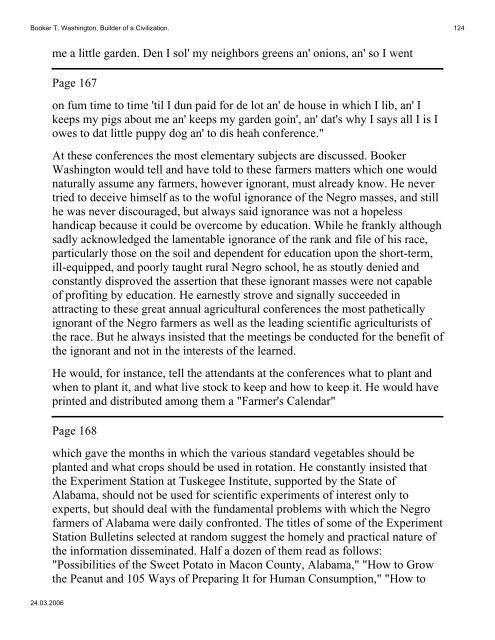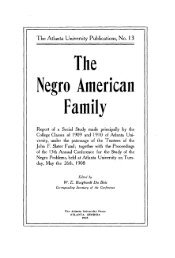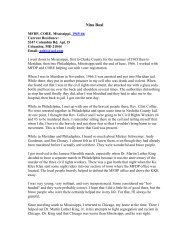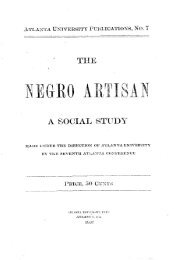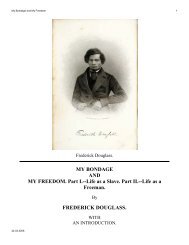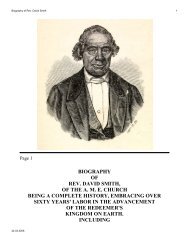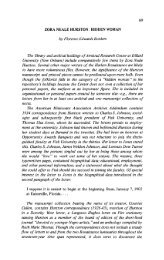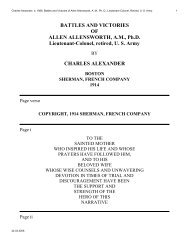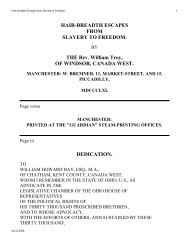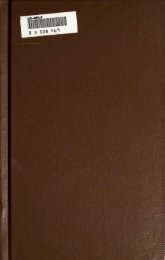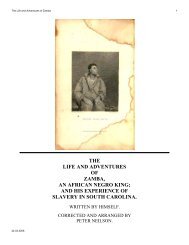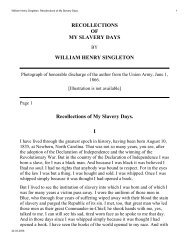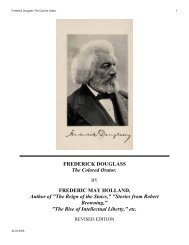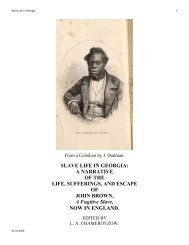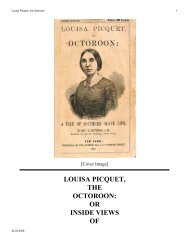Booker T. Washington, Builder o - African American History
Booker T. Washington, Builder o - African American History
Booker T. Washington, Builder o - African American History
Create successful ePaper yourself
Turn your PDF publications into a flip-book with our unique Google optimized e-Paper software.
<strong>Booker</strong> T. <strong>Washington</strong>, <strong>Builder</strong> of a Civilization. 124<br />
me a little garden. Den I sol' my neighbors greens an' onions, an' so I went<br />
Page 167<br />
on fum time to time 'til I dun paid for de lot an' de house in which I lib, an' I<br />
keeps my pigs about me an' keeps my garden goin', an' dat's why I says all I is I<br />
owes to dat little puppy dog an' to dis heah conference."<br />
At these conferences the most elementary subjects are discussed. <strong>Booker</strong><br />
<strong>Washington</strong> would tell and have told to these farmers matters which one would<br />
naturally assume any farmers, however ignorant, must already know. He never<br />
tried to deceive himself as to the woful ignorance of the Negro masses, and still<br />
he was never discouraged, but always said ignorance was not a hopeless<br />
handicap because it could be overcome by education. While he frankly although<br />
sadly acknowledged the lamentable ignorance of the rank and file of his race,<br />
particularly those on the soil and dependent for education upon the short-term,<br />
ill-equipped, and poorly taught rural Negro school, he as stoutly denied and<br />
constantly disproved the assertion that these ignorant masses were not capable<br />
of profiting by education. He earnestly strove and signally succeeded in<br />
attracting to these great annual agricultural conferences the most pathetically<br />
ignorant of the Negro farmers as well as the leading scientific agriculturists of<br />
the race. But he always insisted that the meetings be conducted for the benefit of<br />
the ignorant and not in the interests of the learned.<br />
He would, for instance, tell the attendants at the conferences what to plant and<br />
when to plant it, and what live stock to keep and how to keep it. He would have<br />
printed and distributed among them a "Farmer's Calendar"<br />
Page 168<br />
which gave the months in which the various standard vegetables should be<br />
planted and what crops should be used in rotation. He constantly insisted that<br />
the Experiment Station at Tuskegee Institute, supported by the State of<br />
Alabama, should not be used for scientific experiments of interest only to<br />
experts, but should deal with the fundamental problems with which the Negro<br />
farmers of Alabama were daily confronted. The titles of some of the Experiment<br />
Station Bulletins selected at random suggest the homely and practical nature of<br />
the information disseminated. Half a dozen of them read as follows:<br />
"Possibilities of the Sweet Potato in Macon County, Alabama," "How to Grow<br />
the Peanut and 105 Ways of Preparing It for Human Consumption," "How to<br />
24.03.2006


